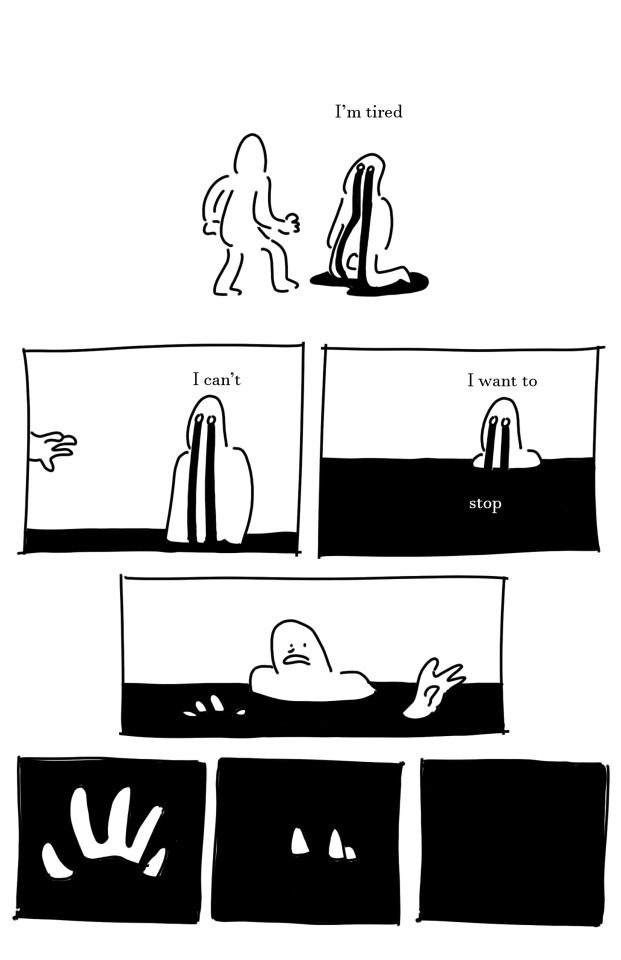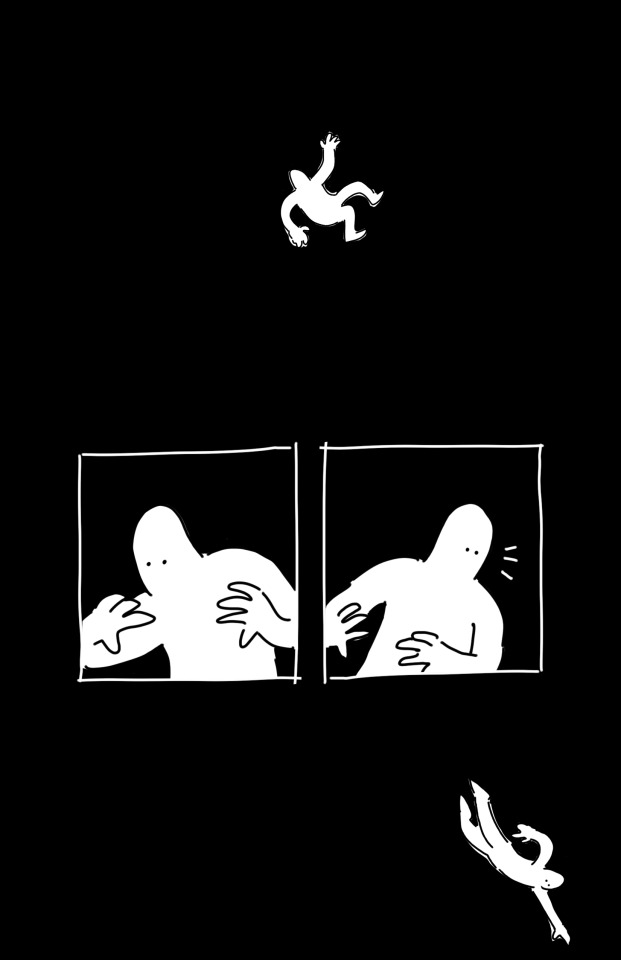Text
Shout out to people with Complex Dissociative Disorders (parents edition):
If your parents genuinely changed and improved overtime
If your parents were absent when you were a kid because they were sick / ill / working / otherwise indisposed
If your parents were not your abusers
If your parents would have acted differently if they knew you were being abused
If your parents didn't have the resources or knowledge to help / understand you
If your parents were loving and yet still neglectful
If your parents inadvertently invalidated / didn't believe you, but now do
If your parents weren't your primary caregivers when the abuse happend
If you weren't abused at all and your trauma was medical / environmental / etc
Had emotionally and physically present parents but you still had disorganized attachment with them as a kid because of your delusions / paranoia / etc.
If your parents regret how they treated you
If your parents loved and love you but acted the way they did because of substances / mental illness
If your parents are not completely bad people, or bad people at all
If you still get along with your parents regardless of what they did
If you ever invalidated your own traumatic childhood experiences because your parents were "too nice"
Your trauma is not less valid if you get along with your parents today. Sure, you needed disorganized attachment to your primary caregivers as a kid to develop a CDD. But that can take plenty of formes, and they don't all include your parents being monsters.
Edit: any other emotions regarding your parents are also valid and okay, and I couldn't mean that more. Childhood trauma survivors go through so many rough emotions, and self-invalidation is sadly way too common. Your feelings are a direct result of what happened and that makes them normal.
3K notes
·
View notes
Text
i love you parts language i love you integration i love you organic fusion i love you trauma processing i love you feeling less fragmented i love you feeling freer from trauma i love you seeing parts as a whole i love you my parts i love you my childhood self i love you healing
0 notes
Text
castle's moodboards: the valley subsys



#note: these parts are introjects from a long time ago. we no longer associate with their source. if you recognise them shh.#alexander#john l#betsey
0 notes
Text
OSDDID terms: a completely subjective rating list by solace
based on this post by @jaybird3756. this is not objective by any means, just personal opinion on what we like to be called. if you love a term we don't like or vice versa, that's completely ok. this is just for fun :)
individual
alters - 7/10. a little clinical but accurate. points taken off because it feels like i'm armchair diagnosing myself when i say it (<-- has been diagnosed for years)
parts - 10/10. we love this one. integrated into the english language enough that it doesn't call attention to it, but also nonspecific enough that it can mean whatever each part wants it to mean. part of a person? part of a system? part of a family? all valid!!! emphasises that we're all in this together, which helps with system unity. can also cover any alter from the most elaborated to the most fragmented. cannot say enough good things about parts language!
headmates, brain friends, other 'quirky' names along those lines - 2/10. idk why it just squicks me out. something about it being so obviously a term that was made up specifically to talk about this experience, which feels othering to me.
others - 9/10. if we can't use parts, we're using this.
voices - either 1/10 or 8/10 depending on context. if it's anyone talking about it in a serious way, ew. if it's someone talking about their own system in a lighthearted manner, it's fun and i like it.
insiders - 4/10. very confusing, do you mean only ish alters? or any alter that isn't the host? it kind of reinforces the idea that only the host is 'real' to me. however, it's not something that makes me feel gross so it's getting a higher score than some others.
people - 5/10. fine i guess. not super accurate in our case, we're heavily fragmented and most of us don't have the emotional range to be considered a fully fleshed out person, but a couple of us like it.
any word referring to family members, friends, or coworkers. - 7/10. discreet, which i like. kind of a cool code if people know what you're talking about. points taken off because i can't tell whether people are talking about their outer life or inner life.
[legal-sounding words] (eg: delegates, jury members) - 8/10. we don't really remember to use it but very fun.
system members - 5/10. accurate, but a bit boring and clunky.
comrades - 8/10 cool and commie.
mes - 5/10. alright i guess. our younger parts use it sometimes.
collective
system (as in 'the system is saying this') - 10/10. the classic.
collective - 9/10. we don't use this personally but i wouldn't think anything of it if we were referred to as one.
constellation - 7/10. cute!! we don't use it but it's cool.
[a name for a group of people] (eg: the kids) - 10/10 if it's accurate, 4/10 if it isn't. one part calls us all children even though he's including the adults in the system and it's a little frustrating.
[a name for a group of animals] (eg: pack) - 2/10. gives me the ick. maybe it's just that i was dehumanised as a kid but please don't call us this.
the [blank] system - 6/10. a bit clunky.
^ shortened to just [blank] (so for us, castle) - 10/10. we like this one a lot. gets rid of the clunkiness but retains the ability to distinguish the whole system from each individual alter.
[a collective human name] (so for us, alex) - 7/10. wish we had chosen a better collective name but it works so it's fine. problems come in when the name is also the name of an alter, or people assume it's the name of an alter when it isn't.
chat - 10/10. no notes, funny as hell.
the counsel - 9/10. yeah man that's what it's like.
identity terms
system (as in 'i am a system') - 8/10. sure.
multiple - 5/10. we don't really experience our did as being a group of people in one body, so it's not really accurate to our experience.
plural - 2/10. ^^ plus it feels icky idk.
dissociative - 10/10. accurate, doesn't sensationalise or put undue focus on the alters aspect of osddid.
person first language (as in 'i have did/osdd') - 10/10. this is one of the only things where we prefer person first language.
possessed - 1/10. we believed this for years and it's not helpful at all. don't ever call us this.
#might make a part 2 where i rate words meaning specific experiences (like coconsciousness or switching)#solace#alexander#<- a little#actually dissociative#sysconversation#(idk if it's supposed to go there lol)
1 note
·
View note
Text
199 notes
·
View notes
Text
Shout out to people with Complex Dissociative Disorders (parents edition):
If your parents genuinely changed and improved overtime
If your parents were absent when you were a kid because they were sick / ill / working / otherwise indisposed
If your parents were not your abusers
If your parents would have acted differently if they knew you were being abused
If your parents didn't have the resources or knowledge to help / understand you
If your parents were loving and yet still neglectful
If your parents inadvertently invalidated / didn't believe you, but now do
If your parents weren't your primary caregivers when the abuse happend
If you weren't abused at all and your trauma was medical / environmental / etc
Had emotionally and physically present parents but you still had disorganized attachment with them as a kid because of your delusions / paranoia / etc.
If your parents regret how they treated you
If your parents loved and love you but acted the way they did because of substances / mental illness
If your parents are not completely bad people, or bad people at all
If you still get alone with your parents regardless of what they did
If you ever invalidated your own traumatic childhood experiences because your parents were "too nice"
Your trauma is not less valid if you get alone with your parents today. Sure, you needed disorganized attachment to your primary caregivers as a kid to develop a CDD. But that can take plenty of formes, and they don't all include your parents being monsters.
3K notes
·
View notes
Text
Things I've experienced post-Final Fusion:
All of a sudden, the days felt really... really... really long. I never really felt like there was any time in the day prior to final fusion; living my life in parts, I had never experienced such continuous flow of time before. It's long.
It feels like I now have a lot more time to do things in the day, and I have to be careful not to push myself too hard. I've found myself being online less and less and getting a lot more involved in my offline hobbies and reading. I have a lot more time to work towards things I want to do.
I can actually think about and plan for the future now, and it's incredibly exciting. I talk to my partner constantly about it. I am very excited about the future.
I can remember so much more of my childhood, things I never thought I would ever remember I now do. That being said, there are still things I don't remember, likely tied to other memory issues, and I've made my peace with that.
While my memory certainly got significantly better in many ways, I've realized I struggle with non-dissociative memory issues as well, and I will live with those issues for the rest of my life; it's just how my brain developed, and that's okay.
Speaking of memory, I can remember things freely that before were limited to the memory banks of my individual parts. I no longer have to worry about what parts hold which memories and go about tracking them down; I as a whole either remember something or I don't, and of my memories, I can remember any of them whenever I want.
I feel a sense of ownership over my life, over my memories and my sense of self and my body. I can look at it all and very confidently say "that's me", and I feel and know it to be 100% true. A long way away from not being able to recognize myself in the mirror.
I can't dissociatively "take a break" from life the way I used to (ie switching out and letting another part handle it), and while it took a long adjustment period to get used to this, I'm okay with that; I have other ways to take breaks while still being present, I can listen to music or watch videos. If I really just need to be unconscious, I take a nap.
I had to come to terms with the fact I couldn't push myself past my limits anymore in the way that I used to, and that this is in fact an expression of self-care for me. I used to be able to push far past what I should have been able to, especially with regards to physical pain, and to some extent I can still do this under specific circumstances, but it is no longer something that I will do in my day-to-day life living with disability and chronic pain.
Actually existing in my body now, I have come to realize just how much chronic pain I have been in. It's made me a lot more alert to my needs and how to care for myself, what makes it better and what makes it worse.
When people say "there's always a chance you'll split again", it doesn't scare me; it comforts me to know my brain would still know how to cope if such an extreme situation occured that I needed to split again. I've worked through dissociative barriers, I could do it again. I know what lies at the end of that path is love.
No part of me has ever gone away. Even fully fused, we are all still here. I can even still communicate with myself as parts if I choose to. I still have parts, they just look different now. There are no barriers between us.
My parts held a lot of different aspects of my identity to them, aspects I'm still to this day sorting out. I've had a lot of realizations about who I am as a person post-final fusion, especially with regards to gender and disability. A lot of things about myself were formerly very heavily fragmented and dissociated which no longer are, and I'm still making sense of them.
I no longer experience flashbacks and nightmares. This is a major thing for me I sometimes still am in disbelief about, my nightmares used to be so severe that I would refuse to sleep because of them, and my flashbacks were horrible and caused very intense physical sensations. I no longer have them, and that's incredible.
Life is so much more vivid and colorful than I ever realized. I never realized how dull everything felt and looked before final fusion. It feels like a complete perspective shift that is hard to grasp in words.
I can feel my body so much more now physically than I ever could before. I feel each of my limbs, I feel changes in temperature, I feel my own breath, I feel different textures and sensations, everything I hear and see and feel and taste has so much more depth to it now.
I have emotions! A whole lot of them, and I can feel all of them. I can feel emotions that might be percieved as "contradictory" at the same time, I can feel emotions over little things and big things and just about anything at all. I'm no longer limited to feeling my emotions in parts, and it's incredibly freeing.
On that note, I have so much more emotional capacity now for feeling all of the love I have for myself and others. It's wonderful. I can't shut up about it.
#not final fused but after a pretty big fusion we have a similar experience#idk if we'll ever finally fuse but im so happy for you
280 notes
·
View notes
Text
holding my OCs that haven't introjected very carefully so that I can continue to play with my dolls and hope that they do not turn into real boys like Pinocchio
2K notes
·
View notes
Text
Visualizing Different Forms of Late Stage Recovery DID / Full Integration
[Note: This is a repost from this post without the long essay attached to it for rebloggability]
We were thinking about it and kind of came to think of a potential visual for Functional Multiplicity VS Final Fusion and the kind of inbetween within the two
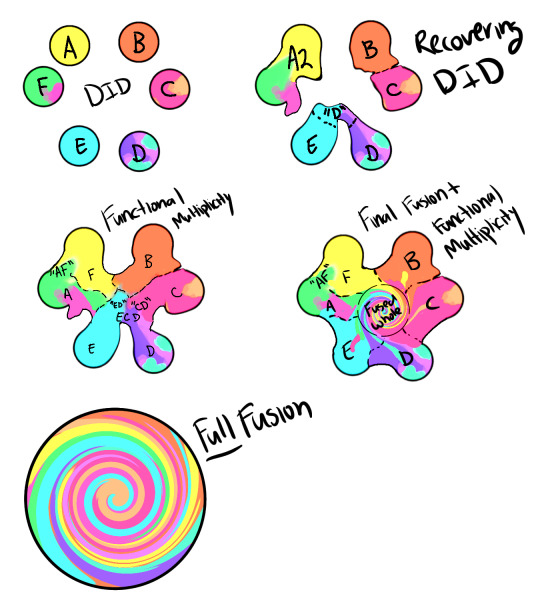
We are middle right.
Top Left:
DID prior to any significant amount of processing and recovery; parts are pretty separate from one another with little permeability between parts; some parts are made up of multiple colors
Top Right:
DID during recovery; some parts fuse and meld together to make new parts, others develop some permeability between parts while still maintaining their separation, communication and co-fronting is easy for these parts and they may have a temporary fused state where the areas overlap
Middle Left:
One form of Full Integration; Functional Multiplicity; All parts are connected through permeable barriers and parts are mostly functioning independently of one another. Some parts may be semi-fused or have temporary fused states for parts they are well integrated with, but they also can retain in their individual states as well.
Middle Right:
One form of Full Integration; Functional Multiplicity and Final Fusion Simultaenously; there is a central and overarching “fused whole” that exists in the center of the system where all parts are blended together to the point it is impractical to label which is which; some parts are not fully blended in with the fused whole and thus it is possible to go into areas of the whole where each part is operating independently; its important to note though that a lot of the time, these parts are still holding parts of their adjacent parts and each section tends to have colors from more than their ��original” self
Bottom Left:
One form of Full Integration; Full and Final Fusion; what some consider ideal and a more traditional idea of “final fusion” where all parts are fully and perfectly balanced and integrated with one another to create a solid singular identity
171 notes
·
View notes
Text
If people were too mean to you when you were growing up, a newborn animal will materialize inside your brain and it’s so so scared and shivering and it will stay there for years. Decades, even. And whenever you say something kind of weird but true to your heart the animal will tell you “Noo! You can’t say that! If you say that, everyone will hate you!”. The animal means well. It’s so so small and everything is so scary for them and it’s just trying to protect you. But listen to me. Listen to me. Whenever this happens, you can’t do what the animal says. You can’t. If you do, you’ll become as scared as the animal. You have to keep saying weird shit. You have to keep doing things the animal wouldn’t approve of. If you do enough things that scare the animal, maybe one day it’ll go to sleep.
53K notes
·
View notes
Text
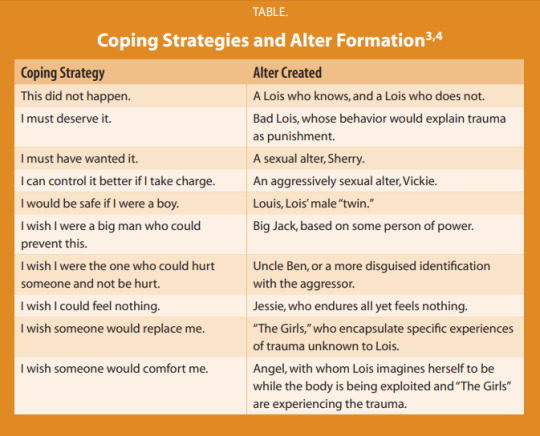
SOURCE (sorry I can't find a free version, I don't remember how I got the full PDF lol)
I just wanted to share this because I've always thought it was a neat chart and I figured sharing might resonate with other people/help them realize stuff/whatever :P
525 notes
·
View notes
Text
So,
There really is nothing on system littles. And what I mean is, despite how long I've been searching I can't find much that helps us actually raise a child. System hosts will mention it, sure, or they'll have a specific alter who is great with kids. But we don't have any of that, and I bet other systems are struggling with this too. So, I'm compiling what I've learned in the past year or so and sharing it as an attempt to help.
This is written from my experiences with my little brother, a traumatized headmate around 10 years old. This might not apply to everyone.
Traumatized children require constant reassurance. They might be easily scared or startled by anything, and hold irrational beliefs that everything will hurt them (me too buddy). They can be the most vulnerable and emotional part of a system. This makes them really important, and in a unique position. They DEMAND attention. Even if they are quiet, if they are dissatisfied, it will come back and bite you in the ass. They require patience and special consideration.
You have to make your child headmate feel safe and comfortable. This is easier said than done. It's a lot more complicated than simply buying some toys and watching cartoons. Children have emotional needs, we all do. They need to feel love and feel like they are part of a family. This is why communication is very important. Communication is different with every system, and we communicate via a variety of writings, pinterest boards, dreams, co-fronting, and more direct but vague ways of throwing emotions at each other, and asking questions and receiving a vague response. This is all to say that even if you literally can't hold a conversation, there is many ways to talk to each other.
In order to meet your littles needs you have to know them first. You can assume the basics, yes, but that will only get you so far. Children also aren't known for their excellent communication skills, so this is a process. My little benefits from a pacifier, which was easy to figure out. But it took longer to realize he also wants his own clothing, and he refuses to wear black because it's a color that is worn too frequently by other alters, and he needs to feel like his own person. This might be a bit ridiculous. A color is just a color, right? No one is going to die by wearing black. But to him it is very important, and he will be distressed if he is not wearing clothes comfortable to him.
And the way our system works is it's easy to feel another alter's distress, so there is no point in wigging a systemmate out for no reason. You want to work together to reduce stress. It makes an easier time for everybody.
Anyways. You will have to make compromises. You make compromises just by being a system. I adjusted our living space to be more "child friendly". I removed the animal bones we had on display. I don't buy decor that my child alter would find scary, even if it's a horror movie character I like, even if I think it's not that bad. If you can make your little feel comfortable even by one percent, it's worth it. I adjusted our room to feel more cheerful. I have a shelf of easily accessible toys. I decorated our house more with cute things. Fridge magnets, goodwill figurines, a printed photo of a puppy, anything to make your syskid feel like this is also their space will help .
This is all I have for today. Thanks for reading!
47 notes
·
View notes
Text

The Queen of the Night (Simon Quaglio, 1818)
11K notes
·
View notes
Text
Having DID is spending every day running back into a burning building because you swear you can still hear someone inside it, begging for a way out.
140 notes
·
View notes
Text




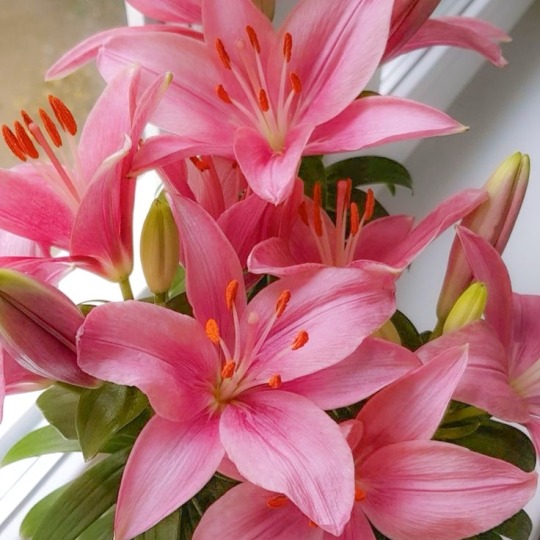


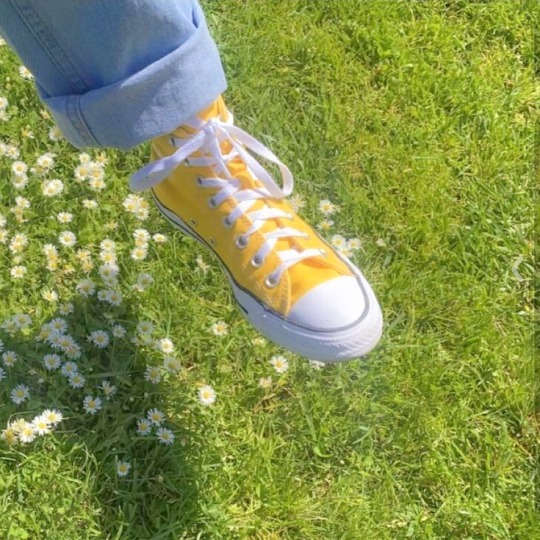

name moodboard for Zoe (anon)
29 notes
·
View notes






